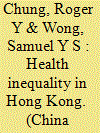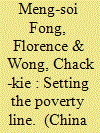|
|
|
Sort Order |
|
|
|
Items / Page
|
|
|
|
|
|
|
| Srl | Item |
| 1 |
ID:
141333


|
|
|
|
|
| Summary/Abstract |
Like other global cities, over the last few decades, Hong Kong has experienced significant economic restructuring with emphasis being shifted to the service sector and the demise of the manufacturing sector. Such economic transformations have inevitably influenced job availability. Without sufficient jobs available for less educated and less skilled workers, a growing number of citizens have experienced a decline in living standards and have even suffered poverty. This article sets out, against the policy context outlined above, to critically examine major policies for helping poor children in Hong Kong, especially when they are confronted with intensified education inequality against the growing trend of privatization and marketization of education. More specifically, the major objective of this article is to examine critically how and whether or not education performs the function of enhancing people’s chances of upward social mobility and reducing inequality between the rich and the poor.
|
|
|
|
|
|
|
|
|
|
|
|
|
|
|
|
| 2 |
ID:
141332


|
|
|
|
|
| Summary/Abstract |
Poverty, social disadvantage and ill health are interrelated. Around the world, poorer and more deprived people tend to have poorer health outcomes than the better off and more advantaged people. This health disparity is commonly referred to as “health inequality.” While health inequality is well studied in long-term developed Western populations, research on this subject is relatively new in the more recently developed populations. We will review the evidence of health inequalities across various socio-economic groups in Hong Kong, one of the first Chinese populations in the world to have been experiencing a very rapid economic transition from pre-industrial to post-industrial living conditions over the past few decades. In this article, we will first review the various important dimensions related to health inequality for a more comprehensive understanding of the concept itself. Then, we will describe the history of the population and the general poverty and social deprivation situations in Hong Kong, and move on to summarizing the evidence for the association of social disadvantage with health inequality in Hong Kong. Last, we will identify the gaps in the research literature and propose studies to be conducted in the future for a better understanding of health inequality.
|
|
|
|
|
|
|
|
|
|
|
|
|
|
|
|
| 3 |
ID:
141334


|
|
|
|
|
| Summary/Abstract |
The first official poverty line for Hong Kong was announced by the new Commission on Poverty during the Poverty Summit on 28 September 2013. However, Leung Chun-ying, the Chief Executive of the Hong Kong Special Administrative Region, stated at the same event that “poverty eradication is impossible.” Based on their misconceptions about poverty, Hong Kong government officials believe that poverty in Hong Kong can only be alleviated but not eradicated. This paper reviews the misconceptions of the government about wealth disparity and poverty, definitions of poverty, and the target of poverty alleviation. Using examples from the United Nations and the United Kingdom, this paper argues that with specific time-bound targets, political will, and the coordinated efforts of society, absolute poverty in Hong Kong can be eradicated, while relative poverty can be reduced as far as possible.
|
|
|
|
|
|
|
|
|
|
|
|
|
|
|
|
| 4 |
ID:
141329


|
|
|
|
|
| Summary/Abstract |
This article aims to give an overview of changing public perceptions of poverty and attitudes towards the causes of poverty based on my research experience on poverty over the past 35 years. The discussion further explains how and why changing public perceptions of poverty exist in Hong Kong, and discusses the underlying values of Hong Kong’s welfare provisions for tackling poverty.
|
|
|
|
|
|
|
|
|
|
|
|
|
|
|
|
| 5 |
ID:
141330


|
|
|
|
|
| Summary/Abstract |
There is increasing concern that poverty has reached an unacceptable level in Hong Kong. This article presents findings from the most current and comprehensive study of poverty and social exclusion. It reveals that the Hong Kong public accepts that a minimum standard of living should incorporate not only basic needs but also opportunities for participation in customary activities. Disturbingly, it shows that deprivation and poverty are widespread in Hong Kong, with many people unable to afford customary items and activities. The article presents evidence on how a combined low income and deprivation poverty measure complements the official poverty line to illuminate the complex social reality of poverty in Hong Kong.
|
|
|
|
|
|
|
|
|
|
|
|
|
|
|
|
| 6 |
ID:
141331


|
|
|
|
|
| Summary/Abstract |
This paper aims to discuss how to properly use the income-based poverty lines to evaluate poor populations and the impact of the government’s policy interventions for alleviating poverty in Hong Kong. It argues that the crucial way to analyse poverty is by using the “pre-intervention” and “post-intervention” income levels as reference points. Once the post-intervention line is accepted by the public to measure the incidence of poverty in Hong Kong, it will enhance our understanding of the cost-effectiveness of the amount of money spent on poverty related measures, and, in return, make it easier to convince the general public with regard to the financial resources that should be allocated for welfare benefits and services, particularly with regard to the “squaring the welfare circle” dilemma.
|
|
|
|
|
|
|
|
|
|
|
|
|
|
|
|
|
|
|
|
|